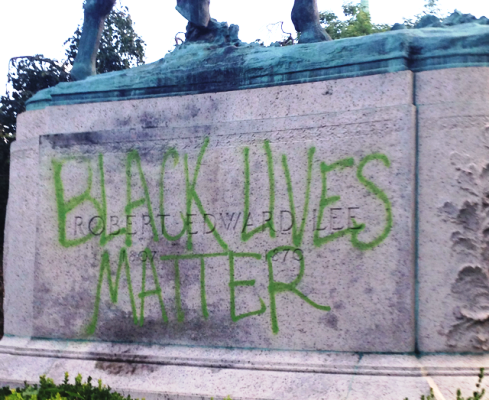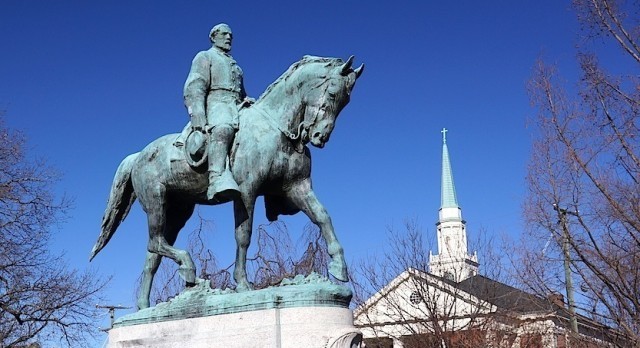Another Historical Monument Under Fire
“Those who don’t know history are doomed to repeat it.” ― Edmund Burke, British House of Commons.
The Vice-Mayor of Charlottesville, Virginia, Wes Bellamy, is leading the charge to request the City Council to order a statue of Robert E. Lee removed, as well as change the name of Lee Park where the statue rests.
Bellamy has planned a press conference, conveniently during normal working hours, for Tuesday, March 22 at 9:30 a.m. He hopes to gather community leaders together in order to pressure the City Council to take action on this critical issue.
Bellamy moved to Charlottesville from Atlanta, Georgia in 2009, and teaches computer science at Charlottesville High School and has aspirations of becoming the principal one day. So, it is surprising that someone who is dedicating their life to teaching our young people is desiring to remove statues that are reminders of where we came from and who we want to be in the future.
General Robert E. Lee, a graduate of West Point, was a brilliant military officer, commanding General in the Confederate Army during the Civil War and a gentleman. He surrendered to Ulysses S. Grant in 1865, thus ending the Civil War. The Civil War is integral to our history as a nation, and contrary to many people’s belief, was not all about slavery, but about States rights.
A few of Bellamy’s reasons for removing the statue are as follows:
- Robert E. Lee has no ties with Charlottesville.
- Several current residents have stated that they believe the statue was used as a psychological tool to show dominance of the majority over the minority during this time period, (1924). Subsequently, a large portion of city residents have refused to step foot in Lee Park due to what they believe the statue and park represent.
- Governor McAuliffe’s veto announced Thursday, March 10th, of House Bill 587 that would have prevented localities from removing monuments of past historical significance, McAuliffe said he supports historic preservation, but called the legislation a “sweeping override of local authority” that has ramifications for “interpretive signage to tell the story of some of our darkest moments during the Civil War.”
In addition to Bellamy’s desire to strip our history away, there is a young high school girl, Zyahna Bryant, who started an online petition to have the statue removed. One wonders if Mr. Bellamy has had an influence on Ms. Bryant’s thinking since she attends the same school where Bellamy teaches.
She apparently is also petitioning for a Black Student Union at her school. So, for someone who wants to erase the history of racism in our country, she chooses to be in involved in areas which are definitely racist towards anyone who isn’t born with the proper amount of pigment.
In her letter to the editor of a local newspaper she shared her thoughts which follows:
- When I think of Robert E. Lee I instantly think of someone fighting in favor of slavery. Thoughts of physical harm, cruelty, and disenfranchisement flood my mind. As a teenager in Charlottesville that identifies as black, I am offended every time I pass it. I am reminded over and over again of the pain of my ancestors and all of the fighting that they had to go through for us to be where we are now.
- Nevertheless, let’s not forget that Robert E. Lee fought for perpetual bondage of slaves and the bigotry of the South that kept most black citizens as slaves and servants for the entirety of their lives. As a result, legislatures of the south chose to ignore and turn a blind eye to the injustices of African Americans from Jim crow and anti-black terrorism to integrated education.
- This past summer, “Black lives matter” was spray painted on the statue. This is just an example of the reactions and the emotions that are evoked because of its presence. Many people, including myself, feel very uncomfortable in the park and we don’t visit it. There are events that I don’t attend simply because they take place in that location.
What I would like to ask Mr. Bellamy and Ms. Bryant, is why stop at Lee Park and Robert E. Lee’s statue? Shouldn’t the city also look at demolishing the University of Virginia as well as his home of Monticello? Thomas Jefferson, after all, owned slaves. If we are to follow the thinking of Bellamy and Bryant, then much would need to change around this city and others.
For example, Washington and Lee University should look into building a new campus and rename it’s school as well. I am sure it causes great emotional turmoil for those black students to attend classes there. Surely Washington D.C. would need to do some remodeling as well.
I think you get my point.
The Civil War happened and no amount of removing statues will change history. What is important though is to teach factual history to our young people growing up in an increasingly hostile world. No one can deny that blacks in our country have experienced horrible treatment, especially during slavery and the Jim Crow years, which Ms. Bryant mentions. But, does she know the history behind Jim Crow?
Democrats were entirely in control through the entire time of Jim Crow laws, and fought against having them squelched. Both in 1956 and 1964 the Republican Civil Rights Act was blocked by the Democrats. An article in The Blaze recounts the specific numbers that might surprise people who have been led to believe the Civil Rights Act was a Democrat idea. The article states,
“Goldwater was one of just six Senate Republicans to vote against the bill in 1964, while 21 Senate Democrats opposed it. It passed by an overall vote of 73-27. In the House, 96 Democrats and 34 Republicans voted against the Civil Rights Act, passing with an overall 290-130 vote. While most Democrats in both chambers voted for it, the bulk of the opposition still was from Democrats.”
The KKK was a product of the Democrats as well, and used in order to keep political control. They would beat blacks until they promised not to vote Republican. This is very similar to how the Democrat party is using the Black Lives Matter organization today. See recent FB account of black police officer who attended Trump rally where BLM was protesting.
 Black Lives Matter (BLM) uses intimidation, vandalism (case in point, the Robert E. Lee statue right), foul language, and harassment to threaten anyone who doesn’t agree with their cause. They trample others first amendment rights when they don’t mirror their own, as has been seen at the republican presidential rallies.
Black Lives Matter (BLM) uses intimidation, vandalism (case in point, the Robert E. Lee statue right), foul language, and harassment to threaten anyone who doesn’t agree with their cause. They trample others first amendment rights when they don’t mirror their own, as has been seen at the republican presidential rallies.
If anyone truly wants to improve race relations in this country, it won’t be Black Lives Matter. They only incites racism, and continually show contempt for those police officers that make it their job to protect the citizens. Anyone who joins a group of people who march down a street chanting, “Pigs in a blanket, fry em like bacon,” when referencing our police officers has nothing in the way of fostering better race relations on their agenda.
At some point, as adults, we need to accept what was our past and not remain entrenched in battles that were fought, and won. I personally am weary of constantly hearing about racism. Martin Luther King expressed it best during his ‘I Have a Dream” speech when he stated,
“I have a dream that my four little children will one day live in a nation where they will not be judged by the color of their skin but by the content of their character.”
In the long run showing respect to one another and raising our children to do the same will go a lot farther than pulling down any statues. And those who are bothered by certain historical monuments would do well to be reminded of the struggles we have been through as a nation and draw pride from the fact we live in the country with the most freedom in the world.



